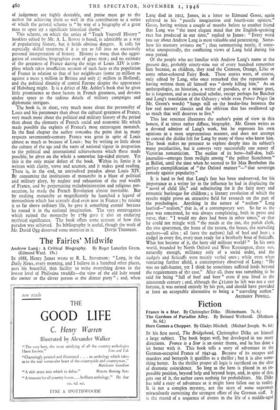The Fairies' Midwife
Andrew Lang : A Critical Biography. By Roger Lancelyn Green. (Edmund Ward. 15s.) Andrew Lang : A Critical Biography. By Roger Lancelyn Green. (Edmund Ward. 15s.)
IN 1888, Henry James wrote to R. L. Stevenson: "Lang, in the Daily News, every morning, and I believe in a hundred other places, uses his beautiful, thin facility to write everything down to the lowest level of Philistine twaddle—the view of the old lady round the corner or the clever person at the dinner party " ; and, when
Lang died in 1912, James, in a letter to Edmund Gosse, again referred to his " puerile imagination and fourth-rate opinion." Gosse, having written a couple of months before to another friend that Lang was " the most elegant mind that the English-speaking race has produced in our time," replied to James: " Every word you say about Andrew Lang is most valuable and penetrating. Some- how his memory irritates me " ; thus summarising neatly, if some- what unexpectedly, the conflicting views of Lang held during his own period.
Of the people who are familiar with Andrew Lang's name at the present day, probably ninety-nine out of every hundred remember him because, as children, they read the Crimson, Orange, Lilac or some other-coloured Fairy Book. These stories were, of course, only edited by Lang, who once remarked that the reputation of having written them all himself was " slowly killing him." As an anthropologist, an historian, a writer of parodies, or a minor poet, he is forgotten, and as a classical scholar, except perhaps for Butcher and Lang's translation of the Odyssey ; while even Prince Prigio (in Mr. Green's words) "hangs still on the border-line between the few real nursery classics and the oblivion that has swallowed tip so much that well deserves to live."
This last sentence illustrates the author's point of view in this honest, if at times rather diffuse, biography. Mr. Green writes as a devoted admirer of Lang's work, but he expresses his own opinions in a most unpretentious manner, and does not attempt to conceal the dislike felt for Lang by many of those who knew him. The book makes no pretence to explore deeply into its subject's many peculiarities, but it conveys very successfully one aspect of Victorian romanticism. The outline of its hero—half-don, half- journalist—emerges from twilight among " the politer Scotchmen" at Balliol, until the time when he seemed to Sir Max Beerbohm the perfect exemplification of " the Oxford manner "—" that sovereign remedy against popularity."
It is hard to feel that Lang's fate has been undeserved, for his importance as a writer lay in the influence he had in displacing the " novel of child life," and substituting for it the fairy story and romantic burlesque for children ; a literary revolution of which the results might prove an attractive field for research on the part of the psychologist. Anything in the nature of " realism " Lang loathed—" realism," that is, of a contemporary sort. So far as the past was concerned, he was always complaining, both in prose and verse, that : " I would my days had been in other times," or that he could not mingle with "the maids at the inn, the parish clerk, the two sportsmen, the hosts of the tavern, the beaux, the starveling authors—all alive ; all (save the authors) full of beef and beer ; a cudgel in every fist, every man ready for a brotherly bout of fisticuffs. What has become of it, the lusty old militant world? " In his own world, bounded by North Oxford and West Kensington, there was, naturally enough, militancy only of a social order, and the cudgels and fisticuffs were mainly verbal ones ; while even when venturing further afield, a contemporary observed of Lang : "He was no tuft-hunter, yet I think he sometimes suffered lords beyond the requirements of the case." After all, there was something to be said for being " full of beef and beer " even if you lived in the nineteenth century • and, although the £12,000 he left was not a vast fortune, it was earned entirely by his pen, and should have provided at least an acceptable alternative to being a " starveling author."
ANTHONY POWELL.


































 Previous page
Previous page